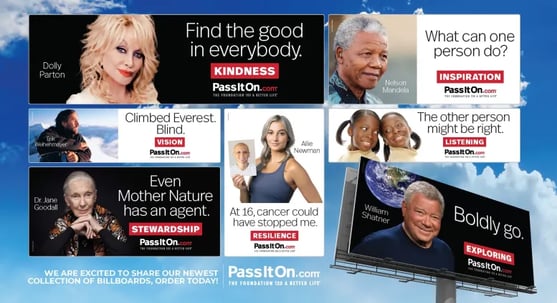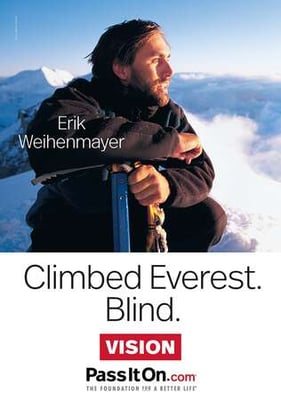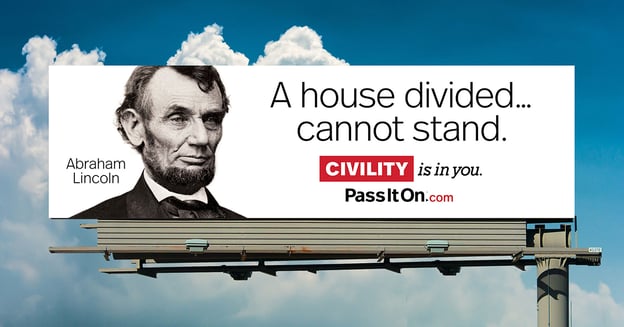
The Sinister Politics of ‘Pass it On’ Billboards ❧ Current Affairs
The inspirational yet vacuous fare that makes a fetish out of individual grit and achievement is funded by a right-wing billionaire who wants you to forget about systemic causes of injustice.
If you’ve ever walked through a major American city, traversed one of its sprawling airports, or chugged across one of its highways, you have probably seen a PassItOn.com billboard. While they vary widely in terms of which celebrity or other noteworthy figure appears, they are nearly uniform in appearance and startlingly simple. Each one bears a celebrity spokesperson, historical figure, or otherwise extraordinary person; a pithy quote or statement related in some way to their contribution to society; and a value they represent.

They are almost jarring in their simplicity. Unlike most forms of advertisement, they ask nothing transactional of you. There is no phone number to dial or product to purchase. And unlike other public service announcements, which usually at least tell you not to drive drunk or start wildfires, there is no discernible call to action—no wounded veteran to help, doe-eyed animal to adopt, political candidate to support, or fetus not to abort.
And yet, somebody is paying to put them up—lots of them. They have been erected in prime real estate like Times Square and outside Dodger Stadium. Walking around Chicago earlier this year, my dear colleague Nathan Robinson and I saw dozens of ads depicting Star Trek actor William Shatner urging us to “Boldly go.” At one point, there were noted to be around 10,000 Pass It On billboards throughout the country.
The Pass It On campaign has run numerous TV and radio advertisements over the years, which its website claims have been “seen in over 200 countries around the world.” Pass It On ads received more than 10 million impressions each day in 2016 and eight out of the top ten PSAs on TV that year were from Pass It On. According to the Pass It On website, its ads have been called “the most successful public service campaign in the history of outdoor advertising” by the Out of Home Advertising Association of America (a trade organization that has existed—who knew?—since 1891).
In addition to celebrities and historical figures, their posters bring attention to regular Americans who engage in charitable acts. Their billboard about “Charity” features the late Albert Lexie, who ran a shoe-shining booth and donated his tips to the Children’s Hospital of Pittsburgh for 30 years.

Many other ads honor Americans who have overcome severe illness and disability, like mountaineer Erik Weihenmayer, who “Climbed Everest. Blind.” or Paralympic gold medalist Marlon Shirley, who “Lost leg, not heart.”


The Pass It On campaign is the progeny of a Denver-based 501(c)(3) organization called The Foundation for a Better Life (which sounds like a fake charity George Costanza would make up if “The Human Fund” didn’t work out). The Foundation, which began in 1999, self-describes as a “nonpartisan, nonsectarian organization” with the characteristically vague mission to “promote positive values and encourage viewers to Pass Them On.” In a video on the site explaining the Pass It On campaign, Gary Dixon, the president of the Foundation for a Better Life, says, “The entire concept.…was to encourage people to pass their values along to someone else.” It then cuts to a country song with the lyrics: “Hold the door, say ‘please,’ say ‘thank you’ / Don’t steal, don’t cheat, and don’t lie” laid over images of a man helping an older lady lift her grocery basket from the bus, a smiling woman purchasing something at a nonspecific item shop, and a young girl hugging her father.
The Foundation for a Better Life website notes that it “choose[s] values we hope most individuals would find encouraging and relevant.” If you don’t apply much scrutiny to the ads, it’s easy to find them encouraging. The ads are not just nonpartisan, but violently uncontroversial in every conceivable way, the sort of vacuous but dimly inspirational fare that would feel at home in a school lunchroom next to “Got Milk?” and food pyramid posters. (In fact, one of the brains behind Pass It On is the late Jay Schulberg, the advertising executive who also came up with the milk industry’s famous “Got Milk?” milk mustache campaign of the 1990s.)
This effort appears, on its face, a very noble endeavor. Values are, of course, good things to have. And there is nothing at all wrong with reminding us to be kind to one another—to give up our seat to an older person on the bus, to help the loner pick up his books when a group of bullies push him over in the hallway, and to treat the kid with Down Syndrome who plays basketball with us like an important member of the team.
But despite the campaign’s plea to be seen as just a benign purveyor of platitudes separate from any ideology, there is indeed a political worldview informing the campaign. This becomes clear when you discover who is paying to put all those billboards up—and what other causes he pours money into which aren’t so inspiring.
The sole benefactor of the Foundation for a Better Life is the billionaire philanthropist Philip Anschutz—a right-wing oil magnate whose influence is similar to that of the infamous Koch Family but who has evaded similar scrutiny. For years, the organization has attempted to hide Anschutz’s association with the Foundation. Between 2001 and 2020, the Foundation for a Better Life charity raked in $55 million entirely from the Anschutz Foundation, according to tax information from ProPublica’s Nonprofit Explorer.1(Because the Foundation is a registered 501(c)(3) corporation, we can guess that some of that money can be deducted from Anschutz’s taxes as well. ) At the time of writing, he is the 45th wealthiest person in America and the 112th richest in the world, with a fortune of nearly $15 billion according to Forbes.2 Anschutz took over his father’s oil company in 1965 and grew it into an empire. Though he’d tapped fields in four states across the American West throughout the following decades, his career was propelled first by the $500 million sale of part of his family’s ranch, which contained more than a billion barrels of oil in total, to Mobil in 1982. From there, he became a sort of Vanderbilt for the new millennium, purchasing, flipping, and selling railroads while using the rights of way to install fiber-optic cable as the founder of Qwest (now CenturyLink). As of 2023, he is the biggest private landowner in Kansas and one of the biggest in the country.

He is also one of the biggest players in the entertainment industry as head of the Anschutz Entertainment Group, which is the second-largest presenter of live music and entertainment events in the world behind Live Nation and is the single largest owner of professional sports franchises in the world. Between 2002 and 2017, Anschutz owned several of America’s largest movie theater chains, including Regal Cinemas, United Artists, and Edwards. He was one of the founding investors in America’s Major League Soccer (whose champions hoist the Philip F. Anschutz trophy), and he spent nearly two decades as a partial owner of both the Los Angeles Lakers and Kings (the latter he owns now as the single owner), as well as the bustling Crypto.com Arena (formerly the Staples Center), where they play their games.
Anschutz is the richest man in Colorado. He hardly lives a life of austerity, but unlike others of his class who run for office, threaten to fight one another in cage matches, and jet into space on private rockets, he does carry himself publicly with what can be mistaken for a sort of quiet, rustic simplicity. He is often described as a sort of billionaire everyman—back in 1999, Brian O’Reilly and Ann Harrington wrote in CNN Money:
“As billionaires go, Anschutz, 59, is abnormally normal. He lives in a relatively modest house in Denver, wears a cheap watch, goes to church regularly, calls his wife ‘sweetie,’ runs unnoticed in local marathons, and has lots of friends.”
In 2000, he won the Horatio Alger Award, which is bestowed upon those who “personify the American Dream and [whose] life experiences are proof that, with perseverance and unwavering belief, anything is possible in our country through the free-enterprise system.” In the video commemorating Anschutz, he describes learning from his father’s struggles with his health and finances and his mother’s “strong moral values and Christian values.” The narrator goes on to describe 8-year-old Philip as an entrepreneurial wunderkind that almost sounds like a parody of one of Alger’s rags-to-riches tales:
“With these influences, young Philip’s own entrepreneurial spirit developed early, as he took on a number of jobs: yard work, grocery stores, and his own chain of lemonade stands.”
He goes on to describe inheriting his family’s oil business and rescuing it from the brink of collapse. “It helps to have your back against the wall,” he says, “Adversity is a huge advantage.” In this sense, the ethos of Pass It On is to fetishize and amplify the idea of ordinary people doing extraordinary things while also “promoting universal values” and “good role models.”
But while Pass It On purports to be an apolitical and secular purveyor of universal virtues, Anschutz assuredly is not. He is one of the most prolific donors to religious right-wing causes and politicians in America. According to OpenSecrets, he and his wife Nancy have personally given more than $5 million to political candidates since 1989—virtually all of which has gone to Republicans. Meanwhile, Anschutz Corporation’s PACs, members, and owners have given another $10.3 million in campaign donations since 1990 and $5.9 million in lobbying since 1998. Meanwhile, virtually every socially conservative or economically libertarian advocacy group of even modest stature has received funding from the Anschutz Foundation.
He has donated to numerous right-wing economic think tanks, including the American Enterprise and the Manhattan Institute. He has given to the Koch Brothers’ massive slush fund known as Donors Trust—which shells out millions each year to organizations that attack environmentalists, public schools, labor unions, and any form of economic regulation that harms the wealthy—and to many other organizations that do the same thing. He has dumped money into right-wing propaganda films—most notably Waiting for Superman, which is full of distortions intended to demonize public schools while promoting charter and private schools.3 As the owner of Regal Cinemas, he funded the Parents Television Council, which has fought for decades to have what they consider to be non-family-friendly television programs removed from the air by government censors. From 2009 until it went belly up in 2018, Anschutz’s Clarity Media Group owned The Weekly Standard magazine, a house organ for neoconservative foreign policy that arguably had more influence than any other publication in pushing the Iraq War in elite circles. He still owns The Washington Examiner, which has published articles casting doubt on the environmental harms of everything from coal to DDT and has said that people who are afraid of climate change should not have children because “IQ is hereditary.”

For years, Anschutz donated to viciously anti-LGBTQ organizations, including The Alliance Defending Freedom, the National Christian Foundation, and the Family Research Council. The most infamous of these is the ADF, a conservative Christian legal advocacy group that made the case for the criminalization of homosexuality in the 2003 Lawrence v. Texas Supreme Court case. The group has since supported efforts to criminalize being gay in several other countries and supported gay conversion therapy in the U.S. Its longtime former president Alan Sears has written extensively on the idea that homosexuality and pedophilia “are intrinsically linked.” More recently, the ADF defended old legislation that had been on the books in Europe which required sterilization of transgender people who sought administrative validation of their chosen gender identity (interestingly, the newly-minted Republican House Speaker Mike Johnson previously spent eight years as senior legal counsel for the ADF). The Family Research Council, meanwhile, has spent more than a decade attempting to push laws in Africa that would jail and even execute gay people—one of their pet projects, known by opponents as the “Kill the Gays” law, passed in Uganda earlier this year.
Anschutz denied donating to anti-gay groups, calling the reports “fake news” and “garbage,” but tax filings show he gave more than $200,000 to these hate groups between 2010 and 2013 and continued donating to the ADF and National Christian Foundation until 2015. Even after Anschutz stated publicly, “I support the rights of all people and oppose discrimination and intolerance against the LGBTQ community,” and gave a large donation to the Elton John AIDS Foundation (whose namesake later appeared on a Pass It On billboard), the donations didn’t stop. In 2018, Anschutz gave $1 million to Colorado Christian University, which has threatened to expel students for same-sex “sexual activity” and “dressing or acting differently than the biological gender that God created a student to be” and gave $20,000 to Sky Ranch Christian Camps, which calls being gay and transgender a sin. Until at least 2016, Anschutz also donated regularly to the Heritage Foundation, which has advocated to defund the President’s Emergency Plan for AIDS Relief (PEPFAR)—a program estimated to have saved 25 million lives since it was started by President George W. Bush in 2003. The Heritage Foundation says that HIV is “primarily a lifestyle disease (like those caused by tobacco) and as such should be suppressed though [sic] education, moral suasion, and legal sanctions.”

If you take the messages of the Pass It On campaign at face value, then this is a story about rank hypocrisy. They claim to be apolitical and non-religious but are funded by a bigwig donor for the Republican Party and the evangelical right. Their ads promote values like “tolerance” and “inclusion” while its benefactor funds organizations that want to make the world less inclusive and tolerant of sexual minorities. They make ads for “Our Beautiful World” filled with sweeping shots of mountains and rivers overlaid with John Denver music while their benefactor gives money to organizations that bash environmentalists. They preach one thing while doing another.
But the problem is not simply that the ads claim to be apolitical while the person funding them quietly pursues a vicious political agenda. The ads themselves also subtly reinforce Anschutz’s worldview but do so through the negation of politics as something worthwhile for ordinary people to practice. For you and me, it’s random acts of goodness and individual perseverance and resilience that will make the world better. For the extraordinarily rich, it’s donations to lobbyists and groups that wish to legislate their values of family, hard work, Not Being Gay, Not Addressing Climate, and so forth.
The typical Pass It On ad does a lot of work to send a contradictory message to its viewers: you, the viewer, can make the world better by heeding its wisdom. But absent from the message is the idea that societal problems can actually be solved by groups of people getting together to change society, or that problems are the result of decisions made by other actors.
Let’s return to the example of Albert Lexie: the shoe shiner who used his tips to pay for medical care for sick children. The Pass It On website reads, “[A]stonishingly, he donates approximately $10,000 a year to the hospital.” The ad is all about celebrating the heroism of Lexie (who was, indeed, extraordinarily heroic!). But also, isn’t it a little bit strange that, were it not for this humble shoe-shiner’s generosity, a bunch of children wouldn’t have been able to receive medical care? (Actually, there’s a scalable policy solution in which everyone gives some of their money for the common good. It’s called taxation!)

This is one of many Pass It On ads that ends up reading like one of those “heartwarming” local news stories that actually just lay bare the cruelty of American capitalism…you know the ones: “Teen gives up college savings to help her mom pay rent,” Teachers chip in sick days so their colleague can take time off to get chemotherapy, Home Depot employees build walkers for toddlers whose insurance doesn’t cover them, “3rd grader uses allowance to pay classmates’ school lunch debt.”
These kinds of stories are hard enough to stomach when they come from a guileless local news anchor. But when a story like this is relayed to you by a guy with a net worth of nearly $15 billion and who has donated much of that bounty to political organizations and politicians dedicated to keeping healthcare an unaffordable, privately owned commodity, it almost reads like a form of taunting.
In the world of Pass It On, the effects of politics, like unaffordable healthcare, exist. But these problems (and their potential solutions) are not treated as political. And the acts that are praised are those that ameliorate the problem (giving some needy children healthcare) yet don’t seek to solve it or address the root cause (a for-profit system in which one is only entitled to the care they can afford to purchase). In this sense, political injustices like lack of healthcare are merely character-building obstacles for individuals to overcome (and for the weakest of the weak, who cannot overcome, there will be ‘compassion’ and ‘charity’ and ‘tolerance’).
The ads, then, are meant to inspire us to become the same sort of self-possessed Horatio Alger character Anschutz imagines himself to be. Often, this comes in the form of portraying the limitless potential for achievement, even for those with the toughest circumstances. A blind person can still climb Everest. A quadriplegic can still graduate from Harvard. An illiterate 70-year-old can still learn to read.4(If they can do all that without help, surely you can pay off your student loan!)
Usually, the libertarian streak is only recognizable through subtext that doesn’t come through unless you are aware the commercial you just watched is funded by a right-wing billionaire. But sometimes, it is right out in the open. Perhaps the single worst Pass It On advertisement—for the value of “Hard Work”—is an honest-to-goodness commercial about the virtues of child labor.

“Ask our father what dreams are made of and he’ll tell you hard work,” the voiceover says fondly. The scene shows two young kids building a brick wall, hands covered in cement, outside of what appears to be a warehouse where their father is shown consulting with another person and machinery moves boxes. “We were kids and he expected us to build The Great Wall of Philadelphia. And he wanted it to be perfect. No friends, no football, nothing.” (The inspirational Gloria Estefan hit “Reach” plays in the background, adding a saccharine overtone to the video.) As the kids’ friends approach, asking them to take a break to toss around the pigskin (lazy bums!), they are forced to decline, which appears to devastate the younger of the two wall-builders.


The ad very deliberately shows the boys constructing this wall for months, doing it in the heat of summer and the dead of winter, all the while appearing rather annoyed and confused about why they’ve been made to do this menial task.5 At one point, they are shown out in the snow standing next to a burning trash can late at night to keep warm while their father grins at them through the window, presumably enjoying the heat and a piping mug of cocoa.


When the wall is finally done after what looks like nearly a year of “no friends, no football, nothing” their dad saunters up to them and knowingly says, “Don’t ever tell me there’s something you can’t do.” The narrator concludes: “There is something I can’t do. I can’t thank him enough!”
This is totally sociopathic! It’s one thing to teach your children the value of working hard, by encouraging them to do things that are fulfilling or valuable in some way. But the message of this ad is that children need to build character by being forced to do mindless busy work for no reason (well, maybe it was for the father’s company’s bottom line?) while shunning any other form of enjoyment. The message is that one should work not because there is important work to be done, but because work itself gives you value (sets you free, one might say). It’s a sentiment eerily similar to something former House Speaker Kevin McCarthy said earlier this year as he advocated for poor children to be required to work to receive welfare benefits:
“We might have a child that has no job, no dependents but sitting on the couch, we’re going to encourage that person to get a job and have to go to work, which gives them worth and value.”
Anschutz has been very candid about the fact that he views the values in his ads as being more conducive to human flourishing than actual policy changes. Anschutz told the Philanthropy Roundtable in 2009:
“Food banks, charter schools [LOL], and homeless shelters are a good way to help people. But in the long run, people grounded in solid values will be better situated to prosper on their own.”
The PassItOn campaign is clearly positioned not just to gently remind people to be kind but to promote mere individual acts of kindness as a form of activism. In the Foundation’s welcome ad, Bob Doyle, the longtime manager for country singer Garth Brooks, says that because of Pass It On’s ads, “You might care about somebody or a situation in another way that you never even thought about before, but it provokes you to take action, or to do something or to change your point of view.” (Interestingly, on the Pass It On website, a creepy-looking Brooks is shown accompanied by words that seem to evoke a post-racial fantasy: “When there’s only one race and that’s mankind…we shall all be free.”) Evan Lamberg, the President of Universal Music Publishing North America says the ads “have massive impacts.” Dixon, the organization’s president, says, “It has made a difference: people have felt uplifted, they’ve felt encouraged. They’ve felt like, wow, I’d thought we’d forgotten about values, but we haven’t.” The Foundation for a Better Life is even partnered with the Random Acts of Kindness Foundation, which urges people to become “RAKtivists” by doing things like “write a handwritten letter and mail it” or “write positive messages on sticky notes and leave for others to find.”
On the rare occasion when the Pass It On campaign does discuss politics, the idea that anyone might have strong political convictions that they fight for is treated with contempt. Take their ad for “Civility,” which takes place at a town meeting.

A man in a red tie slams his hand down on the table in the following exchange with a lady in a blue shirt (no prizes for guessing what the symbolism here means):
Red Tie Guy: Well, you’re wrong!
Blue Shirt Lady: I’m wrong!? You’re the one that misrepresented the facts!
Guy: I misrepresented the facts? Are you kidding?! Your proposal is ridiculous!
Lady: You have no right to call—
Guy: You are the worst example of politics!
Lady: I stand for something!
Guy: You flip flop!
Lady: I stand for something!
Guy: Flip flopper, flip flopper!
Lady: Your proposal’s ludicrous!
Guy: My proposal will go exactly the way I say it will.
Lady: Over my dead body!
Then, an adorable little girl chimes in with a Michelle Tanner-style punch line: “I think somebody needs a time-out!” and everyone learns their lesson and agrees to be nice and civil and never yell about politics again.
But did you notice that during that entire exchange, you never learned what they were actually arguing about? Maybe Blue Shirt Lady wanted to pass an ordinance that would make it easier to pollute the town’s water source. Perhaps Red Tie Guy wanted to require every teacher to carry a Glock or ban every book about gay people. The message the ad communicates is that having strong political opinions and fighting for them is stupid and mean, and that no political issue—no matter how dire the consequences—could possibly warrant getting angry or raising your voice. This just so happens to be a very useful message for someone who is giving millions to Red Tie Guy so he and his friends can keep cooking the planet with fossil fuels.
Another “Civility” ad, released in 2018 at the height of the Trump-era moral panic about political polarization, features Abraham Lincoln.

One needn’t be a historical scholar to see the problem with this. Of all the virtues that should be associated with Lincoln, a propensity toward compromise is not one of them. In fact, in the 1858 speech from which this quote is lifted, Lincoln specifically argued:
“[T]his government cannot endure permanently half slave and half free. I do not expect the Union to be dissolved – I do not expect the house to fall – but I do expect it will cease to be divided. It will become all one thing or all the other.”
What makes Lincoln unique is that he refused to compromise with the slave-holding South, as many of his forebears had, and went to war to fight for his belief in abolition—a decidedly un-“civil” thing to do.
To treat Lincoln as someone defined by his ability to find common ground with his opponents is a vile act of historical legerdemain. But it’s one that serves a purpose. It helps to reinforce the larger worldview that Anschutz and the Foundation are trying to push, which erases the concept of political conflict and boils every political debate down to one of manners and ideas. It is perfectly consistent for a far-right billionaire to promote such pablum. Incivility, through mass protest or organization, is antithetical to not only their view that Great Men alone move the wheels of history, but to their material interests as billionaires.
In the utopian future I like to imagine, in which humanity has transcended the need for profit and unleashed its full glorious potential, I’d hope the spots that once contained billboards for payday loan operators and Carl’s Jr. would be transformed into pro-social monuments to human achievements. I’d hope we’d use them to remind people to share and help one another. I’d hope to see them honor the humanitarians and innovators who created that utopia—the ones who ensured that everyone in the world has clean drinking water, the doctors who finally found the cure for cancer, and the leader who makes sure that cure is free for everyone to receive. I want to see billboards that honor those who achieve the impossible as well: the quadruple amputee who circumnavigates the globe in a 17th-century schooner, or the person who creates a device allowing humans to communicate with seahorses.
But this is the sort of project for when all of society’s collective problems have been solved. Not for one with more than half a million homeless people, millions of children hungry, and where more than one in four people have put off medical care because they can’t afford it. The Pass It On campaign’s existence is one of the most profound examples of why nobody should have a billion dollars, let alone $15 billion. If, as it does in our society, having billions of dollars confers political power on a person, and if the person who has that money happens to be dumb as rocks, then the way that vast sum of money is spent will also be dumb as rocks, and there’s not a damn thing the public can do about it.

When thinking about the Pass It On campaign, I’m reminded of one of the most infamous tweets of all time. In 2014, as Israel pummeled the Gaza Strip with airstrikes following rocket attacks by Hamas as part of Operation Protective Edge, the YouTuber Keemstar tweeted, “Israel & Palestine need [to] study John Lennon Imagine.” The Pass It On campaign is what it would look like if we turned that childish prescription into actual public policy. It’s as if, instead of providing humanitarian aid or demanding our president push for a cease-fire, we used that money to blast Lennon’s song from atop Mount Sinai in hopes that the combatants would put aside their petty squabble.
The Pass It On campaign offers platitudes as a replacement for politics. It acknowledges that the world is full of suffering, but treats that suffering not as the result of how our society is structured, but as a failure of each individual to be kind and charitable or the failure of the disadvantaged to rise up and beat the odds through sheer determination. It’s reminiscent of Margaret Thatcher’s famous statement that “There is no such thing as society. There are individual men and women, and there are families.” This is a useful attitude for one of America’s wealthiest people to promote because it tells people that they are fundamentally alone. If people who struggle are busy looking within themselves, they’re not busy looking at the guy with all the money and at the destructive right-wing political agenda he supports.
Tax information from 2016 was not available and was not included in our calculations. In 2015, the Foundation brought in $1,763,735 and in 2017, $1,789,543. Assuming the number from 2016 is similar, that puts the total between 2001 and 2020 at nearly $57 million. There was no information for years after 2020. This calculation also does not include contributions to the Random Acts of Kindness Foundation, which also regularly receives anywhere from a quarter of a million to more than a million dollars each year from the Anschutz Foundation. ↩
Forbes’s rankings of the richest people in America and The World’s Real-Time Billionaires update so frequently that it likely will have changed by the time you are reading this. Just in the time between when this article was initially drafted and when it was published, he jumped from being America’s 56th richest person to its 45th richest. The point is that Anschutz is rich as hell. ↩
For more on why Waiting for Superman is disastrously flawed, we recommend an excellent debunking titled “The Myth of Charter Schools” by Diane Ravitch in The New York Review of Books. ↩
The man in question, the late Alferd Williams, was Black and “was born in 1937 in Eudora, Arkansas,” according to the Pass It On site, which means he went through the education system during Jim Crow segregation. Black illiteracy was much higher as a result of school segregation and horribly underfunded schools. The ad makes no mention of this, but it does say that his parents were “sharecroppers” and that because Alferd and his twin brother needed to help with work, they were forced to “alternate days” attending school. It goes on to explain that Alferd never learned to read because his brother would wake up earlier and sneak off to school on days when it was Alferd’s turn. Alferd learning to read at age 70 is treated as an inspirational story (and, of course, his achievement is remarkable!), but the solution is treated as individual: Alferd just needed to sit down and learn to read. There is no mention of the fact that Alferd was only in that situation in the first place because he grew up poor and Black in an extremely unequal society which forced him to sacrifice schooling at a young age in order for his family to survive. ↩
The online page about this ad provides an unusual amount of behind-the-scenes detail about its filming process: “‘The Wall’ was a challenging spot in terms of art direction, as the team had to portray months of time in 60 seconds. The spot was shot in the middle of the summer but needed to depict day, night, warm weather and even snow in the span of the spot. Fortunately for the actors who play the two boys, they only had to ‘build’ one part of that wall.… [C]rew also had to return the warehouse area to its original state, dismantling both the wooden and brick parts of the wall after shooting was done.” So the wall they built was worthless both in-universe and real life. ↩


